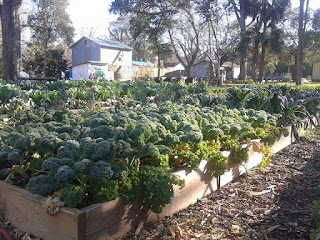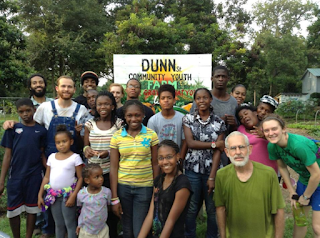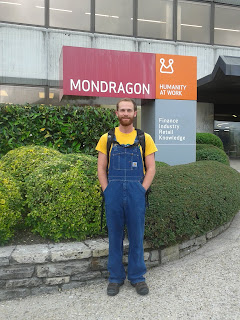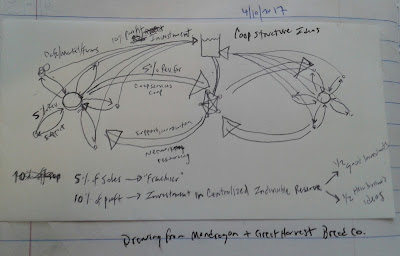Here's a rough sketch to whet your appetite:
My take on this shared dream draws from a mix of personal sources:
1) 2010, I met City Farm Boy in Vancouver. He was growing veggies for 50 families on 8000 square feet (i.e., 1/5th acre). All his customers lived within 1/2mile of his house; most walked to pick up their weekly produce box. This stands in contrast to the current models of local food that rely on farmers driving 5 to 10 to 50 miles into town and 50 customers all driving 2 to 10 to 20 miles to the farmers' market, which-- though better than 1500-- still amounts to a lot of miles. My other takeaway from Vancouver was the number of families he was feeding, 50. Living with my folks at the time, there were 900 households in their neighborhood. At 100% market penetration, that's 18 farmers in a single neighborhood! (Just for vegetables!) Ok, 100% is never reasonable, but what about 5%? That's roughly one micro-farm in each major neighborhood. I'm dreaming of "corner farms" as prevalent as McDonald's.
2) As I reflect on my experience in cultivating Tallahassee Food Network's iGrow Whatever You Like youth farm, I carry a few things with me. First, communities are hungry for beautiful, productive urban agriculture spaces. We had folks who would stop by on their commutes to/from town just to "walk through the garden." Ironically, second, we had a hard time shifting people's life and habit patterns to make veggie purchases at iGrow. Neighbors would walk and drive right by our youth farm on their way to the store to pick up items we grew. Takeaway: to be successful, we have to integrate other habit patterns into any urban ag business model. Think dog walking, morning coffee, socialization, prepared food purchases. I want to capture the atmosphere of a community coffee house but put it in the midst of a beautiful, productive urban farmscape. Lastly, iterating a space, program, and business model in partnership with all involved (youth leaders, neighbors, volunteers, and customers) proved to be an awesome way to develop a model that worked and was supported all, and, interestingly, is in sync with lean startup practices that rely on early/ often customer feedback.
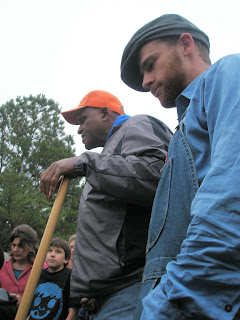 |
| Man in Overalls with Growing Power Founder, Will Allen |
4) In 2015, my wife Mary Elizabeth and I visited the Mondragon Federation of Cooperatives in NW Spain. The big takeaway was their "multi-stakeholder" cooperative model, which is the ultimate expression of reconciling and drawing from the expertise of the constituencies necessary to run a boomingly successful business. It takes workers, customers, investors, and community-- all of us collaborating and working in sync to thrive-- and there's already a democratic business structure model for how to do it profitably.
Here's the dream in a nutshell:
A cooperatively-owned chain of cafe-market-farms
Think the atmosphere of a community coffee house, but take away the building and replace it with a Parisian brick-patio cafe space shaded by a grape arbor-- in the midst of a beautiful, intensively productive community farm. The model's core will include a production mini farm that grows for the super-local market, providing a monthly all-you-can-pick subscription (think NetFlix) or a 1-hour or less harvest-to-delivery freshness; a cafe serving prepared food, ideally hot food, smoothies at a minimum; a mini-market with farm-fresh produce complimented with organic "commodity" items like onions and potatoes plus grocery basics like milk and eggs; the space will also serve as base of operations and education for an expanded food gardening business that helps people grow their groceries the easy way (in their own spaces) -- in keeping with my current business model.
Imagine neighbors taking their evening dog walk here. Can you imagine grabbing your morning coffee or meeting friends for a smoothie? The cafe will serve dinner without a million choices, but instead a daily offering or two based on the farm's bounty. The question will be "how hungry are you?"-- instead of a menu with 47 choices to make. It'll be like going to a friend's for dinner, and the simple menu will keep prices down. I want folks stopping through to buy fresh bread sourced from a local bakery, gardening classes for kids, cooking workshops that start with harvesting veggies right behind them; I see a crew heading out to build food gardens at area homes and businesses. And I see one of these cafe-market-farms in all major neighborhoods. Each cafe-market-farm will be organized as a semi-autonomous (multi-stakeholder) cooperative that brings workers, customers, and community supporters to the table. Autonomous, but not alone, each cafe-market-farm will benefit by affiliation with the others by sharing best practices in a "learning network" and synchronized back-of-the-houses. The cafe-market-farm coops will invest 10% of their profits into a "pay it forward" model to financially capitalize additional cafe-market-farms and invest 5-10% into the community as a way to reciprocate to the community for its patronage. We start in Jacksonville with the flagship, get the single cafe-market-farm model tight, expand to several across town, get the coop-of-coops model tight, and then head down I-10 with it all the way to Houston.
There are plenty more details of the dream that's emerging and more roots most especially the partners and collaborators. Some of us overlap in our ideas almost completely, others less so; some of us are already working together, others not yet or in fledgling ways, but allow me to name some folks in Jacksonville with whom I'm excited to be talking and mutually supporting in the urban ag (& good food) arenas: Betty Burney, Laureen Husband, Karen Landry, Kevin Anderson, Diallo Sekou, Allen Skinner, Angela Tenbroeck, Corey McNair, Melissa Beaudry, Valerie Hermann, Don Justice, Ju-Coby Pittman, Sylvia Powell, Ingrid Mathurin, Teena Anderson. Thank you all for advancing my thinking and for doing what you do that inspires us all towards the greater good food vision. I look forward to working with these folks, those to whom they're tied, and many more.
--And, while I'm dreaming, if my cafe-market-farm dream is a tree (so to speak), perhaps even a cluster of trees, there's a forest idea to go along with this dream, but I'll leave that for another time. For now, I'll leave you with a sketch of a possible cooperative structuring for you to consider.
Allow me to close with a food gardening tip:
I've long used 5/8" rebar cut to 6'8" lengths to stake my tomatoes. If you prune the suckers, like I explain in this How-To video, you can grow tomatoes very close together in order to maintain order and achieve a much higher overall yield/space than a single tomato plant in a cage that inevitably escapes and grows all over the place. But that's old news. What's new are these amazing ties I just found (in the picture). They loop back on themselves, and save tons of time compared to using tie tape, string, or cutting strips of old rags, like I did as a kid. Worth checking out.
- - -
Nathan Ballentine (Man in Overalls)
Itinerant Urban Farmer, Entrepreneur, Educator, Community Organizer
Growing in Jacksonville, FL. Connecting Globally.
(904) 240-9592
Email Man In Overalls at Gmail dot com
Man in Overalls on FB & IG
ManInOveralls.com
Blog - Services - Projects - Resources - About
If I can support you in growing your groceries locally (here in NE FL)...
please, click here to see my services & book me for a consultation, so I can assess your site; we'll discuss design, answer your questions, talk #s, and get your project lined up. I offer turn-key raised bed food garden support services. Also, with the fall season on the horizon if you'd like me to lead a Food Gardening 101 workshop in your neighborhood or for your community garden, shoot me an email.
If you'd like support with a project elsewhere...
I thrive on collaboration and new ideas, so please send me an email.
please, click here to see my services & book me for a consultation, so I can assess your site; we'll discuss design, answer your questions, talk #s, and get your project lined up. I offer turn-key raised bed food garden support services. Also, with the fall season on the horizon if you'd like me to lead a Food Gardening 101 workshop in your neighborhood or for your community garden, shoot me an email.
If you'd like support with a project elsewhere...
I thrive on collaboration and new ideas, so please send me an email.
If you'd like to support me...
in freely sharing my stories & expertise, please consider passing along this article to a friend. Each of my articles take 5-10 hours of resource gathering, writing, and editing, so I want to make sure they don't just sit on the digital shelf.
PS- Keep abreast of my workshops & speaking engagements here.
Respectfully,PS- Keep abreast of my workshops & speaking engagements here.
Nathan Ballentine (Man in Overalls)
Itinerant Urban Farmer, Entrepreneur, Educator, Community Organizer
Growing in Jacksonville, FL. Connecting Globally.
(904) 240-9592
Email Man In Overalls at Gmail dot com
Man in Overalls on FB & IG
ManInOveralls.com
Blog - Services - Projects - Resources - About
